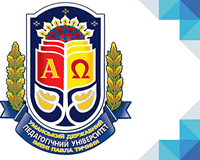Будь ласка, використовуйте цей ідентифікатор, щоб цитувати або посилатися на цей матеріал:
https://dspace.udpu.edu.ua/handle/6789/3199Повний запис метаданих
| Поле DC | Значення | Мова |
|---|---|---|
| dc.contributor.author | Підгаєцька (Овсяннікова), Анна Віталіївна | - |
| dc.date.accessioned | 2015-10-14T17:08:48Z | - |
| dc.date.available | 2015-10-14T17:08:48Z | - |
| dc.date.issued | 2015 | - |
| dc.identifier.uri | https://dspace.udpu.edu.ua/handle/6789/3199 | - |
| dc.description.abstract | Teachers usually imagine that they teach students who want to learn. Often students do want to learn, sometimes don’t. Students bring to the classroom a rich and diverse array of prior experiences, values, thoughts, ideas and cherished believes. We teach our subject, but we understand that what we teach can conflict with what students want to believe. A thought a teacher wants to teach doesn’t, by itself, do the work of thinking. Stating a sentence repeatedly doesn’t encourage a student to take in the thought of the sentence. Thinking is work. But the work of thought is in the complex resituating of the thought over time in propitious contexts that can make the emergent thought possible and meaningful. This complex resituating of thought in new contexts is part of a creative work of teaching, and there is no substitute for it. You cannot drive a thought into the mind of a thinker. You must allow and encourage minds to do their own proper work of contextual assimilation as numerous changing contexts for thought allow an anxious thought to become drained of its attendant anxiety. | uk |
| dc.language.iso | uk | uk |
| dc.relation.ispartofseries | УДК 378.14+005 | - |
| dc.subject | THE DESIRE ‘NOT TO KNOW’ AS A CHALLENGE TO TEACHING | uk |
| dc.title | THE DESIRE ‘NOT TO KNOW’ AS A CHALLENGE TO TEACHING | uk |
| dc.title.alternative | БАЖАННЯ «НЕ ЗНАТИ» ЯК ВИКЛИК ПРОФЕСІЇ ВЧИТЕЛЯ | - |
| dc.type | ConfThesis | uk |
| Розташовується у зібраннях: | Факультет іноземних мов | |
Файли цього матеріалу:
| Файл | Опис | Розмір | Формат | |
|---|---|---|---|---|
| Pidhaietska_tezyseminar.pdf | 33,3 kB | Adobe PDF | Переглянути/Відкрити |
Усі матеріали в архіві електронних ресурсів захищені авторським правом, всі права збережені.

